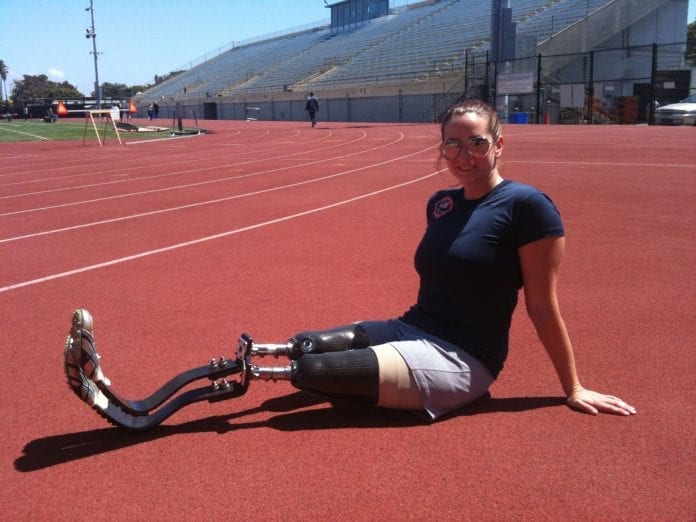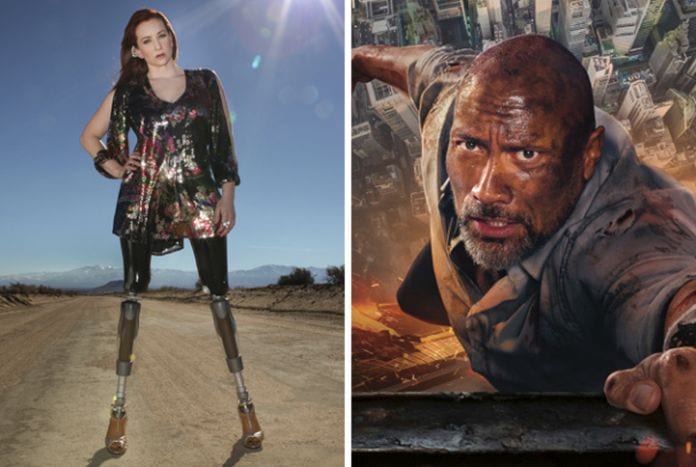Katy Sullivan, who is an actor, athlete and above knee amputee, recently wrote to Dwayne The Rock Johnson about a role in his last movie Skyscraper, asking him to say “NO” to the roles like the one in the movie. The reason for her asking this is that there are so many actors in Hollywood, like herself, who don’t get the opportunity to act in some movies due to their disability, so parts like this would be more available and natural for them as they know how it feels like being without a leg or both of them. A four-time U.S. Paralympic champion in the 100 meters added that they give a bad example for a young, disabled and above all talented actors who would be afraid of casting because they think no one would hire them. She asked not only him, but all of the actors to refuse those roles, to be more than a name above the title which sells a movie, to do more for the community.

All these things and more, you can read in her letter below.
Dear Dwayne,
My name is Katy Sullivan. I am an actress, Paralympian, double above-the-knee amputee from birth, and I have a request to ask of you. You seem like a genuinely good dude, so I hope this will be received in the spirit that it was intended: Actor to Actor.
Your most recent film, Skyscraper, opens this weekend. Cheers! Congratulations! However, my request is for you to stop saying “Yes” to roles like the one in that movie. And here’s why…
Individuals with disabilities make up almost 20% of the world’s population. We are the largest minority and the “most marginalized group in Hollywood,” according to a 2017 study conducted by Fox, CBS and the Ruderman Family Foundation (an organization I know you are aware of and engaging with now). The study found that in last year’s TV season, less than 2% of characters were written to have a disability and of THOSE characters, 95% of the roles were filled with able-bodied actors.
While I am thrilled that a film about a kick-ass veteran and father (who is a unilateral below-the-knee amputee) got greenlit in the first place, the problem is this perpetuates the fact that we’re not given the agency to tell our own stories.
This very week, Scarlett Johansson has been getting a lot of heat from the LGBTQ community for portraying a transgender character in Rub and Tug. Rightfully so, as there are many talented trans actors out there who could be portraying that role instead of her. Actors that would bring beautiful and complicated authenticity to the project without having to reach outside themselves. The outcry is about inclusion. TRUE inclusion.
This is also the truth for performers with disabilities being sidelined so that able-bodied actors can “play at” what it’s like to live life with a disability. What we lose in that is the genuine, authentic perspective. There is a bit of a misconception that a performer with a disability wouldn’t be able to handle the grueling schedule of a feature film. This community of ours contains some of the strongest, most capable and tough individuals imaginable. And the amount of determination they need to just deal with a world that wasn’t made with them in mind is staggering. Try navigating New York City in a wheelchair. Believe me, a movie set is a dream.
I’ve had conversations, recently, with some high-level development executives in Hollywood, and when I’ve challenged them on casting, the response I’ve often gotten is that “a movie won’t get made without a name above the title.” And I get it. That IS a concern: the bottom line. I work in this industry too.
However, a performer with a disability will never get to the point of being “a name above the line” unless they are given the opportunity to get on that path in the first place. By casting these roles with people who bring authenticity to them, (i.e., an actual amputee actor) you in turn change the talent pool over time. Because maybe there’s a kid living with limb loss out there who hasn’t taken an acting class, or gone to an audition before, because of the thought “Who’s gonna cast ME?” If they can see it, they can be it, right? But they have to SEE IT. That’s the difference.
There seems to be a lack of social outrage for able-bodied actors playing disabled characters. In fact, they are often celebrated for it, from the Golden Globes to the Oscars, for taking on such “difficult material.” Why wouldn’t an actor want to tackle roles so rich? But it’s that lack of authenticity that continues to make humans with disabilities feel invisible, me included.
I was quite young when I saw Forrest Gump. I didn’t know who Gary Sinise was then (sorry, Gary) and for the first time IN MY LIFE, I saw another human being whose body looked like mine, a double above-the-knee amputee (don’t get me started on the fact that he was a man — lack of female perspective is a separate letter altogether). Then I found out that Gary was able-bodied, wearing long green socks on his lower legs, and they erased them out of the film. And in that instant, I felt erased too.
Photoshopped out of existence.
Something that made me feel so hopeful, at one point, ultimately made me feel even more alone in the world. That movie came out in 1994, almost 25 years ago, and very little has changed in Hollywood since then.
Though it has been a huge challenge to break through the noise, I am extremely grateful to be a working actress. I recently starred in the 2018 Pulitzer Prize-winning play Cost of Living, am currently flying back and forth from L.A. to New York between shooting a film and pitching a TV series. Even though these roles are very few and far between, (and even fewer and further between if they are willing to cast an actual performer with a disabilities), I count my lucky stars to have been able to piece together a career that I’m quite proud of. And even with all of that, I was uncertain whether or not I should speak out at all.
Will it make a difference?
Will it move the needle?
Last year we had Stronger, the year before that Me Before You, and up next is Don’t Worry, He Won’t Get Far on Foot. Movies exploring what it feels like to live life with a disability, all cast with able-bodied actors pulling on the green socks or getting cozy in a wheelchair. And the executives and producers don’t seem to be doing anything to change things quickly, so I am reaching out directly to you, a fellow actor, and someone who genuinely seems like a good guy.
I know you have expressed support of authentic casting recently. And that’s a step in the right direction. But the step in a better direction would be, the next time you are presented with an opportunity to portray a character whose life experience includes some sort of disability, please consider saying “No.”
Ask if they have looked for an actor who wouldn’t have to “put on” the mask of disability. Is there an actor out there who could play a kick-ass father that scales a building to save his family who also happens to be a unilateral below-the-knee amputee? If so, I encourage you to stay on as a producer with the project so that there IS a name above the line that could help get this movie made or better yet, play his amazingly awesome best friend and save his family together.
We need more A-list celebrities like you saying “no” to taking away roles from our community. And until that happens, I will have continue to consider taking that job as Miranda Otto cut in half just to try to make my health insurance for the year (spoilers to those who haven’t seen Annabelle: Creation yet). And I’m not only picking on you specifically. This is a much larger problem than just The Rock and Skyscraper, but go big or go home, right?
“Can you smell what The Sully is cookin’…?”
It’s when we all band together to do the right thing for TRUE inclusion and diversity that we start to change not only the landscape of our entertainment, but through that, we change the perception of what individuals with disabilities are capable of doing (in general).
Keep being awesome and thank you for your consideration.
Sincerely,
Katy Sullivan









